- Home
- Janice Kay Johnson
Plain Refuge Page 5
Plain Refuge Read online
Page 5
“No.” Onkel Samuel wouldn’t approve of lying, but... “He asked what my last name is. You greeted him then, so I didn’t have to answer, but what if he asks again?”
He pondered that. “Outsiders join us sometimes. Someone named Holt could be one of them.”
“Yes, but if he looked me up in his computers, he might find me. And Matthew’s name is different from mine, besides.” She hesitated. “I did lie to him. I said I had come from Pennsylvania.”
He frowned. “Perhaps we should tell him what you fear. Someone must set things right. I think he can be trusted.” Still, he sounded reluctant.
Inexplicably, the idea of confiding in Sheriff Byler was appealing...as was he. And that triggered a new kind of alarm. Being attracted to him was a really bad idea. Plus, a physical attraction was absolutely the wrong reason to trust him. She could easily imagine him being cocky enough to think he could solve her problems, and arrogant enough to do what he thought best without asking her first. And that was assuming he didn’t have more in common with Estevez than she wanted to believe.
“The fewer people who know I’m not Amish, the better,” she said slowly. “What if he tells a friend, or one of his officers, who tells someone else? So fast, everyone could know.”
“If you ask him to keep silent...”
“Why don’t we wait and see what happens?” she said. “He came out here and saw that I’m doing fine. He may have satisfied his curiosity.”
After a moment, he nodded. “Ja, that is so.”
Rebecca hesitated. “You don’t think I’m off in the head to think someone was trying to kill me?”
“Wu schmoke is, is aa feier,” he said without hesitation.
That much of the language she remembered: where there is smoke, there is fire.
“God asks us to trust in Him, but He does not say to be a fool,” her uncle added. “When a horse lifts a hoof and I see he will set it down on my toes, I move my foot schnell.”
“Denke,” she said, torn between humor and tears.
He only smiled and said, “I must get back to work.” Clapping his straw hat onto his head, he departed.
It took her a moment to collect herself enough to rise and say, “Let me wash those dishes, Aenti Emma.”
* * *
DANIEL DROVE AWAY from the Graber farm no more satisfied than before. He knew he didn’t have Rebecca’s whole story. She’d failed to offer her last name, which increased his suspicion that she was running from an abusive spouse.
He didn’t much like that explanation for several reasons. At the forefront was the danger to Rebecca and her kid. In his experience, domestic violence was like dynamite, volatile and deadly.
What was most puzzling was the rarity of an Amish woman fleeing from her husband. They were a peaceful people, committed to nonviolence. Domestic abuse existed among them, but forgiveness was so ingrained that women rarely gave up on a husband. Or perhaps it was more that the women knew how few alternatives they had. If the abuse was bad enough, she might go to her bishop, who would chide the husband, maybe going so far as counseling him and demanding he confess and beg forgiveness from the entire congregation. But for the wife to take her child and run... Daniel had never heard of such a thing.
Even as he brooded, Daniel noted how well the corn seemed to be coming on, thriving in the heat. Many local farmers would plant a second crop once the corn was harvested—soybeans had become a success in the difficult northern Missouri climate, but many of the Amish chose a cover crop like forage turnips, which provided good grazing for livestock and kept down weeds. Even the Amish moved with the times, just with more deliberation than their neighbors.
He wasn’t sure what more he could do to help Rebecca when she so clearly didn’t want his help. Daniel fully understood the stubborn refusal of the Amish to turn to outsiders. Samuel Graber was a capable man, and he had extended family in the county. Yet he was ill equipped to counter violence. The best he could do was slow down an intruder to give Rebecca and Matthew time to hide in the barn or the woods at the back of the property. Samuel would let himself be shot rather than strike a blow.
And that was where Daniel had collided with the Ordnung, the rules directing the people that had once been his.
No, his decision to go out in the world had been more complicated than that, as nearly every life-altering decision was, but he knew his father or mother would say sadly, “Daniel could not forgive.”
To them it was that simple.
He wished he thought any of the Grabers would call him if a dangerous man came seeking Rebecca.
* * *
“SLEEP TIGHT.” REBECCA kissed her son’s forehead and stood. She lifted the kerosene lamp to light her way back downstairs. Thank goodness Matthew had never been afraid of the dark.
“Mommy?” he whispered.
She paused and turned back.
“Can Daddy come see us here?” Matthew asked. “I bet he’d like the horses, too.”
He’d asked about his father when they first set out, but not since. After a moment, she returned to sit on the edge of his bed again. Smoothing his hair, she said, “You know how hard he works. He wouldn’t be able to get away for days and days. This is our adventure.”
“But...what about when it’s his weekend?”
His weekend had just come and gone. She didn’t like to think about how he’d reacted.
“We’ll make up for it later,” she said. “Just like we do if he has to travel for work and can’t be home for his weekend.”
Matthew was quiet. She knew he understood that much.
“I don’t know when we’ll go back,” she said softly. Or if. “Aren’t you having a good time?”
“Aenti Emma makes good cookies. And I liked fishing with Abram and his dad.”
Mose, the son who farmed alongside Samuel, had his own house and a growing family on the far side of the cornfield. In his thirties, he already had four children, the oldest almost eleven. Like Matthew, Abram was six.
“Only, Abram doesn’t talk that good.”
“That well. And Abram talks just fine, but he’s only starting to learn English. I actually thought he was doing pretty well with it for his age.”
“But how come he doesn’t speak English? Everyone does.”
So she explained again how the Amish people spoke their own language, and that children weren’t usually exposed to English until they began school at six years old. By the time they finished eighth grade, they would be able to speak two languages, which was more than you could say for the typical American student.
Matthew was quiet long enough that she hoped she could slip out, but then he said, “Abram wants me to go to school with him. He says Sarah will be his teacher.” He sounded astonished.
Rebecca smiled despite feeling a pang. When would she be able to have her own classroom again? She could hardly apply for jobs now. “It’s true. Cousin Sarah is a teacher. Just like teachers and kids at home, she has the summer off. She told me that tomorrow she is going to the schoolhouse to start preparing for the new school year. I offered to help her clean. You can come with us, if you’d like.”
“Can Abram come, too?” he asked, with eagerness that encouraged her.
“If his mamm and daad say he can. Now.” She made her voice firm. “Sleep, and no argument.”
“’Kay,” he murmured. “But you’ll come to bed real soon, too, won’t you?”
“I will.” Without electricity or television or smartphones, there was little temptation to stay up late. And on a farm, the work began early.
She kissed him once again and this time made her escape, taking old worries and new ones with her. What would she say if Matthew kept asking about his father? If he begged her to let him call Daddy? And how would he react when he found out he likely wouldn’t
be in Mrs. Chisholm’s first-grade classroom this fall, but would instead be joining his cousin Abram and the other children in their church district in a one-room school?
He was young. He’d adapt.
But Rebecca knew she’d keep asking herself if this huge adjustment she expected of him was fair or even possible. And yet Tim had let her know he couldn’t protect her or Matthew. Her priority had to be keeping herself and Matthew safe. If Tim truly loved their son, if he felt even a shadow of affection for her, he would understand what she’d done.
How long would they have to stay in hiding? Right now, all she could do was check the internet for any news about Steven, Josh, Tim or the construction company when she could make it to the library in Hadburg. If she found no news about an arrest or closing of the investigation, at some point, she had to talk to Tim again.
But not yet.
CHAPTER FOUR
A WEEK AFTER his visit to the Grabers’, Daniel strolled down the middle of Grove Street, the main drag in Hadburg, closed today to motorized vehicles and horses and buggies for the three-block length of the business district. Instead of the usual traffic, stores had flung open their doors and spread out onto the sidewalks. Booths and tables offering crafts, fresh-picked produce, desserts and a bounty of home-canned goods lined both sides of the street. The quilt shop had attracted a crowd of locals and tourists with half a dozen tables covered with packets of coordinated fabrics and small quilts, mostly Amish made. Even the Amish Heritage Furniture store displayed small side tables and quilt racks on the sidewalk.
So far, so good. The cop in him leaned toward pessimism, but there was no reason to think there’d be any trouble. Support for the volunteer fire department was genuine hereabouts. People recognized its importance in their lives. Today’s fair was part of an effort to buy a new tanker for the department. Naturally, the Amish were the big draw for outsiders. The tourists were thrilled because the street was thronged with Amish, buying and selling.
The impetus for the event had been the fire out at the Bontrager place in early July. The barn had not only burned to the ground, but sparks had caught on the roof of the house and they’d lost it, too. A tanker truck full of water might have made a difference. The drought had left the creek at the back of the property running too low to be any use.
Although Amish and Englisch neighbors alike had joined to rebuild, Eli Bontrager ran his harness business out of that barn. His tools, supplies and finished products had all been casualties, as had a young horse that pulled his daughter’s open buggy.
Shaking off the memory of the horse’s screams and the devastation on the faces of the entire family, Daniel ambled for another half block, exchanging greetings. He was glad to see so many people supporting the fire department. Their town didn’t usually draw tourists the way the larger and better-known Jamestown did.
Today was hot as sin—a saying his father had particularly disliked. Had to be over a hundred in the shade. The stifling humidity didn’t help. His summer-weight uniform already had wet circles beneath his arms. He could feel sweat running down his spine. Water stations up and down the street offered relief, and merchants and police alike knew to watch for the effects of heat on shoppers.
He’d have been happier if the plan hadn’t included a beer garden, set up in the small park, which also boasted a bandstand and a bronze statue of a local Civil War hero, a major in the northern army. Some still muttered that there ought to be a statue representing the Confederate side, as well—or instead. Missouri had been torn in two by conflicting loyalties and an ugly guerrilla war between the Union army and the raiders with Confederate ties.
Food booths in the park were doing good business. His stomach rumbled at the smells emanating from grills. Seeing that Anna Ropp was selling her pierogi, Daniel veered in that direction.
But he detoured at a raised voice in the roped-off beer garden. He shook his head at the sight of an all-too-familiar face, flushed with anger and a beer or two too many. Billy Shaver. No surprise, his brother Damon was with him. Daniel had intended to make one of his every-couple-week stops at their run-down rural property in the next day or two, anyway. The two younger Shaver brothers had walked out of the penitentiary only four months ago after serving time for operating a meth lab in their barn. The oldest Shaver, Jethro, had another six months to go.
Stopping just outside the rope, Daniel caught their attention. “How you boys doing? Good you’re out here supporting the fire department.”
Billy, the hothead, opened his mouth but swallowed whatever he’d been about to say when Damon elbowed him.
“Just having a beer,” Damon said. “Thinking about some lunch. Nothin’ wrong with that.”
“Not a thing,” Daniel agreed, aware of their audience. “I was heading that way myself.” He looked over the park. “Hadburg is doing itself proud today. Haven’t been called for so much as a shoplifter.”
Billy snickered. “Guess them weirdos think God would strike ’em dead if they stole a stick of gum.”
Quelling his instinctive dislike for this weasel, Daniel only said easily, “Don’t know that it’s that extreme. They’re raised to believe taking something they haven’t earned is wrong. They don’t lie, either.”
“So that guy over there—” the little creep jerked his head toward a middle-aged Amish couple walking side by side “—tells his wife she’s a fat cow before he climbs on top of her?”
“That’s a good woman,” Daniel said quietly. “She deserves respect.” Figuring he’d about reached the end of his store of tact, he nodded and said, “Enjoy yourselves,” and walked away.
As much as he disliked the Shaver brothers, he had to wonder how much of a chance any of them had ever had, being raised in that house. Their father had been even more notorious than they were. Once Daniel became sheriff, he had reviewed the domestic violence calls to that address, ending with Clara Shaver dying from a supposed fall down the stairs. Her husband had ultimately drunk himself to death, but not before he’d ruined his sons.
Behind him, a woman’s voice rose above the hubbub. “Matthew! Matthew!”
He swung around to see a frantic Rebecca spinning in circles as she screamed her son’s name. People hurried to her, trying to help, but she didn’t even seem to see them.
Daniel reached her in a few strides. “Rebecca.” More sharply, he repeated her name, and she finally focused on his face.
“When and where did you last see your boy?”
“I was buying carved wooden horses from Ike Schwartz, and when I turned around Matthew was gone.” Wringing her hands, she cried, “He knows better! What if somebody—”
“I think I see him,” he interrupted. Without conscious thought, he slid into Deitsch. “Ja, there is Mary Yutzy, holding his hand. See?” He risked touching her, nudging her to face the woman who hurried toward them, holding the little boy’s hand.
Her body quaked until she spotted her son, and then she sagged. Afraid she’d go down onto the concrete sidewalk, he supported her with his arm. But she sprang to life, leaping first to hug Matthew, then to scold him. She appeared to be unaware of the many people listening and probably wondering, as he did, that she spoke English. Did her boy not know Deitsch at all? Daniel speculated. How could that be?
Finally she wound down enough to thank Mary and him. Mary patted Rebecca a few times before hustling back to her table, where she sold honey from her hives.
“Have you two had lunch yet?” Daniel heard himself ask.
Her sky blue eyes widened. “I—”
Matthew shook his head. “Uh-uh. I’m hungry, Mom. Did you see those giant pretzels? I bet they’re good. That’s where I went. I woulda come right back, ’cept you weren’t there.” The accusatory tone suggested that if Mom hadn’t panicked and started running around like a chicken with her head cut off, she’d have seen him right awa
y. That she’d been afraid he was lost wasn’t his fault.
Daniel didn’t show it, but he thought if Matthew wasn’t an all-American kid, he’d eat his hat. The one he rarely wore, of course. Speaking of which...
He ruffled the boy’s blond hair. “Did you lose your hat?”
Matthew ducked his head guiltily. “I don’t know where it is.”
His mother rolled her eyes.
“Come on.” Daniel smiled at her. “I’ll buy you lunch.”
That earned him another wide-eyed look of alarm. “Oh, you don’t need—”
“I’d enjoy the company.” He glanced at the boy. “Best get Matthew out of the sun.”
“Oh!” she exclaimed. “I left my bag—”
While he waited with Matthew, Rebecca hurried back to Ike Schwartz’s booth, returning with a woven-grass shopping basket that bulged with her purchases.
He set them moving across the lawn toward the food booths and tents that lined the north end of the park. The location had been chosen to take advantage of the big shady sycamore trees. A couple dozen plastic tables and chairs provided a place for folks to eat.
While mother and son looked at the vendors, Daniel radioed to let his officers know he was taking a break and where to find him. Matthew didn’t seem to have ever seen a pierogi and went for a hot dog, while Rebecca chose chili and corn on the cob. Daniel bought giant snickerdoodles for all of them. Matthew decided they were almost as good as his grossmammi’s.
Daniel grinned at him. “Even if they were better, a smart boy wouldn’t say so, would he?”
“Uh-uh.” He had a cute grin that gave him dimples and displayed missing teeth.
Rebecca’s bruises had faded and the swelling had gone down, letting him see that she had a classic heart-shaped face, a high forehead framed by rich chestnut hair parted simply down the middle, in the Amish way, and a gauzy white prayer kapp with the ties loose. The lilac color of her dress and apron enhanced the blue of her eyes. He guessed her to be five foot six or seven, and curvy. Despite the modest dress with a hem at midcalf, he could tell that much.

 Home Deadly Home
Home Deadly Home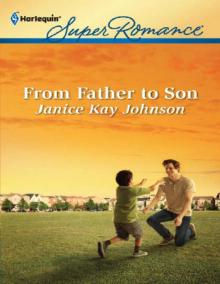 From Father to Son
From Father to Son All the Lost Little Horses (A Desperation Creek Novel Book 2)
All the Lost Little Horses (A Desperation Creek Novel Book 2) Hide the Child
Hide the Child Within Range
Within Range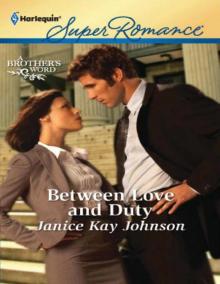 Between Love and Duty
Between Love and Duty First Comes Baby
First Comes Baby Charlotte's Homecoming
Charlotte's Homecoming In A Heartbeat (HQR Superromance)
In A Heartbeat (HQR Superromance)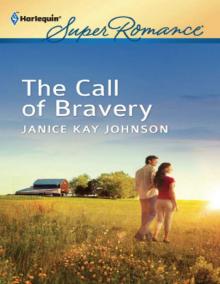 The Call of Bravery
The Call of Bravery In Hope's Shadow
In Hope's Shadow Anything for Her
Anything for Her Harlequin Superromance September 2014 - Bundle 1 of 2: This Good ManPromises Under the Peach TreeHusband by Choice
Harlequin Superromance September 2014 - Bundle 1 of 2: This Good ManPromises Under the Peach TreeHusband by Choice The Baby Agenda
The Baby Agenda More Than Neighbors
More Than Neighbors Her Amish Protectors
Her Amish Protectors All That Remains
All That Remains Whisper of Revenge (A Cape Trouble Novel Book 4)
Whisper of Revenge (A Cape Trouble Novel Book 4) In a Heartbeat
In a Heartbeat A Mother's Claim
A Mother's Claim Because of a Girl
Because of a Girl Back Against the Wall
Back Against the Wall Dangerous Waters
Dangerous Waters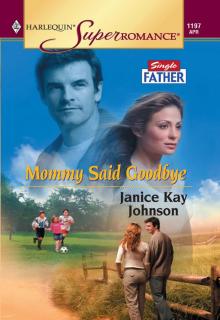 Mommy Said Goodbye
Mommy Said Goodbye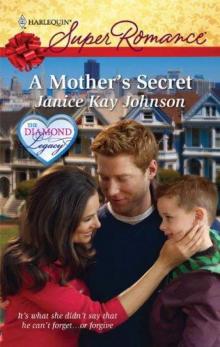 A Mother's Secret
A Mother's Secret See How She Runs (A Cape Trouble Novel Book 2)
See How She Runs (A Cape Trouble Novel Book 2) Plain Refuge
Plain Refuge Bringing Maddie Home
Bringing Maddie Home For the Girls' Sake
For the Girls' Sake Through the Sheriff's Eyes
Through the Sheriff's Eyes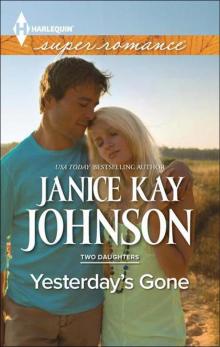 Yesterday's Gone (Two Daughters Book 1)
Yesterday's Gone (Two Daughters Book 1) All a Man Is
All a Man Is Harlequin Superromance January 2014 - Bundle 1 of 2: Everywhere She GoesA Promise for the BabyThat Summer at the Shore
Harlequin Superromance January 2014 - Bundle 1 of 2: Everywhere She GoesA Promise for the BabyThat Summer at the Shore No Matter What
No Matter What Wakefield College 01 - Where It May Lead
Wakefield College 01 - Where It May Lead Someone Like Her
Someone Like Her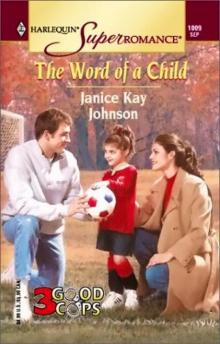 THE WORD OF A CHILD
THE WORD OF A CHILD Harlequin Superromance May 2016 Box Set
Harlequin Superromance May 2016 Box Set Open Secret
Open Secret The New Man
The New Man Finding Her Dad
Finding Her Dad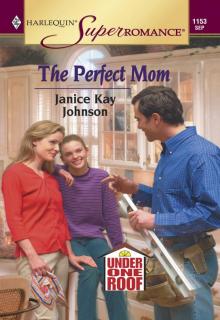 The Perfect Mom
The Perfect Mom All Through The House
All Through The House Match Made in Court
Match Made in Court Making Her Way Home
Making Her Way Home From This Day On
From This Day On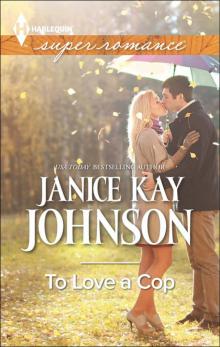 To Love a Cop
To Love a Cop The Hero's Redemption
The Hero's Redemption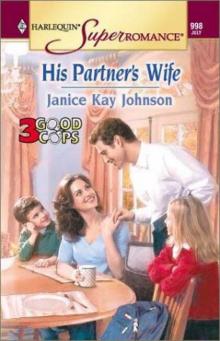 HIS PARTNER'S WIFE
HIS PARTNER'S WIFE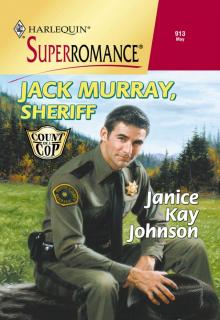 Jack Murray, Sheriff
Jack Murray, Sheriff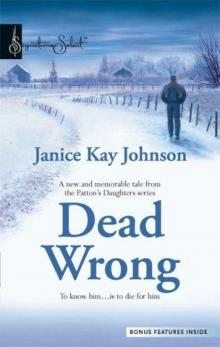 Dead Wrong
Dead Wrong Twisted Threads (A Cape Trouble Novel Book 3)
Twisted Threads (A Cape Trouble Novel Book 3)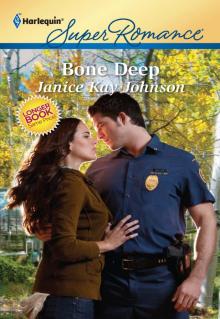 Bone Deep
Bone Deep The Closer He Gets
The Closer He Gets With Child
With Child Whose Baby?
Whose Baby? Kids by Christmas
Kids by Christmas